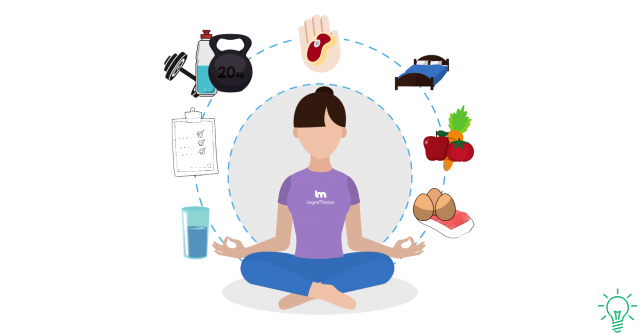Why are we sometimes unable to maintain concentration? Fatigue or stress are two determining factors. However, there are others we don't always pay attention to.

Last update: July 23, 2022
Lack of focus can be a real problem in daily life. There are times when we set ourselves a task, we start working and we feel the ideas flow, the mind remains focused and we even finish earlier than expected.
Other times, however, albeit with the same motivation, what has been described does not occur. We struggle to stay focused, we get distracted easily, we can't go on and end the day feeling like we have wasted our time.
When lack of concentration occurs occasionally it can be considered normal; if instead the problem becomes persistent, ends up affecting not only productivity, but also motivation and the sense of self-efficacy.
Common causes of lack of concentration
Concentration is the ability to keep attention on a specific task, thus improving performance. Without this skill, carrying out complex tasks would be impossible.
Staying focused for very long periods of time (sustained attention) sometimes it may require considerable effort on our part.
In the following lines we examine some common variables or factors that can compromise the ability to concentrate; most of us can be exposed to them in our lifetime.
1. Exhaustion
Sometimes we don't realize it, but staying focused takes a lot of energy and in the long run it can be exhausting.
If in our daily life we have to carry out various very complex tasks, without pauses that allow the brain and the senses small pauses, soon our energies will run out and it will be difficult to maintain concentration.
Likewise, if for some reason we cannot sleep peacefully, we will quickly reach a state of exhaustion mental which affects the ability to concentrate.
2. Stress
Personal or work problems can raise your stress levels beyond a healthy limit; attention is one of the cognitive faculties that is most affected by this.
In these cases, there is an erosion of emotional resources which increases subjective discomfort and decreases motivation; secondly, we have intrusive thoughts related to problems that do not allow us to concentrate.
3. Bad eating habits
Maintaining concentration consumes energy. Well, if the body does not receive an adequate energy supply, this deficit will result in a reduced ability to concentrate.
An unbalanced diet has been observed to negatively affect the ability to concentrate at school since childhood; this can last into adulthood.
Since bad eating habits can accompany us from childhood, sometimes we are not aware of its effects. However, they are a factor to consider not only because of their direct impact on the ability to concentrate, but also because metabolism slows down with age, which exacerbates the effects of a poor diet.
4. Use of substances and lack of concentration
Habits associated with the consumption of certain substances can cause difficulties in concentrating, even if the degree of dependence has not been reached.
The consumption of alcohol and hallucinogenic drugs impairs the ability to concentrate as long as their effects last. But when consumption is sustained, the effects persist even when there is more biological trace of the substance in the body.
The same goes for the consumption of substances such as sugar and caffeine, which alter brain activity. Sugar is typically associated with increased energy, while caffeine can also improve focus for a short time.
The problem is that when the effects wear off, we can experience a decrease in attention. This is more dangerous when consumption is constant, as the changes in the brain become more stable.
5. The environment
A workspace that constantly demands our attention and repeatedly changes tasks; very demanding work relationships; an environment full of distractions such as television, cell phones, or people talking nearby; light and sound conditions that overwhelm and involve our senses over and over again.
They are all examples of environmental conditions that negatively affect our ability to concentrate. When we have to focus on a task, the brain tries to ignore irrelevant stimuli and focus on the challenge to be solved.
This is impossible when requests from the surrounding environment are so intense or persistent that they force the brain to pay attention to them, breaking concentration and forcing you to start over.
How to prevent lack of concentration
Engaging in recreational activities that require sustained concentration is a good way to train this skill. Reading, writing, sports, arts and even video games require active attention to perform.
If you have identified one or more of the causes of lack of concentration listed, you may want to put some tips into practice:
- Improve your sleeping habits. Take active breaks during the day and get enough sleep at night and in good condition.
- Eat a more balanced diet and avoid less nutritious foods.
- Regulate the consumption of certain substances, such as alcohol, coffee and sugar so that they are not part of the daily routine.
- Organize working spaces and hours. Dedicate the necessary time to each task, neither more nor less.
- Building healthy relationships and identify sources of stress.
- To practise full awareness to improve attention management.
Conclusions
In case you notice that your concentration problems persist despite efforts to improve the situation, you can seek help from a mental health professional. The latter will be able to assess whether the causes of this are related to some habits or, instead, to a more complex disorder.


























